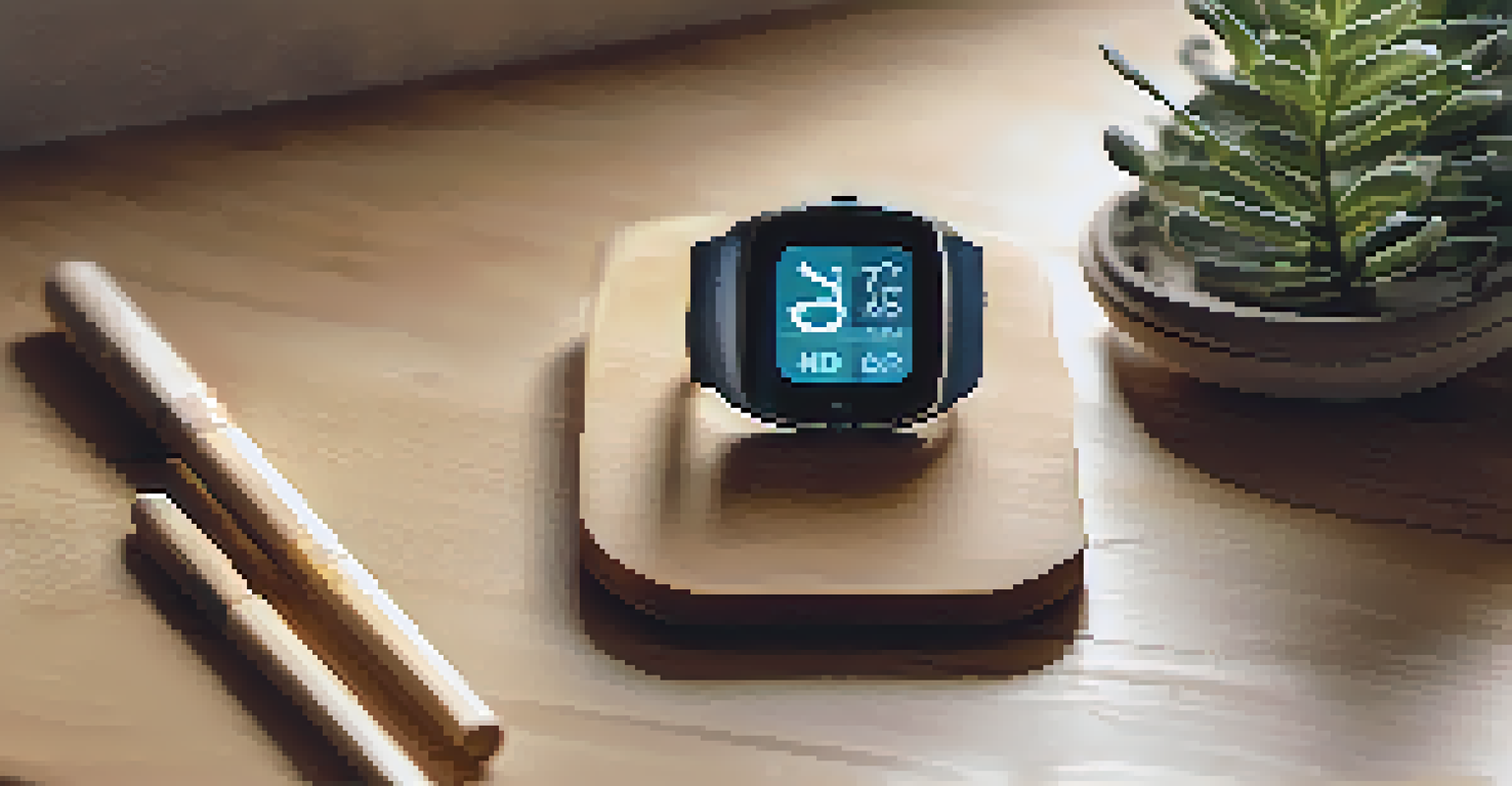The Role of Technology in Managing Mental Health Conditions

The Rise of Teletherapy and Online Counseling Services
In recent years, teletherapy has emerged as a game-changer for mental health support. Virtual counseling allows individuals to connect with therapists from the comfort of their homes, breaking down geographical barriers. This accessibility has made therapy more available, especially for those in remote areas or with mobility challenges.
The greatest weapon against stress is our ability to choose one thought over another.
Furthermore, online counseling platforms often provide flexible scheduling, which can be a lifesaver for those juggling work, family, and personal commitments. The convenience of fitting a session into a busy day can reduce the stigma and anxiety often associated with seeking help. It's like having a therapist in your pocket, ready when you need them.
However, while teletherapy is beneficial, it's essential to ensure that these platforms maintain a high standard of care. Professionals must be trained to navigate the nuances of virtual interactions, fostering a genuine connection that can sometimes be challenging through a screen.
Mobile Apps: Tools for Everyday Mental Health Management
Mobile apps have become an integral part of managing mental health, offering users a range of tools at their fingertips. From mood tracking to guided meditation, these apps empower individuals to take an active role in their mental wellness. Think of them as a personal wellness coach available 24/7.

Many popular mental health apps provide features like journaling prompts, breathing exercises, and even community support forums. This sense of connection can help users feel less isolated in their struggles. With the tap of a finger, users can access a wealth of resources that cater to their specific needs.
Teletherapy Expands Access to Care
Teletherapy breaks down geographical barriers, making mental health support more accessible, especially for those in remote areas.
However, with so many options available, it’s crucial for users to choose apps that are backed by research and designed by professionals. Not every app is created equal, so investing time to find reputable choices can significantly impact the effectiveness of these digital tools.
Wearable Technology: Monitoring Mental Health in Real Time
Wearable technology, like smartwatches and fitness trackers, is revolutionizing how we monitor our mental health. These devices can track physical indicators such as heart rate and sleep patterns, which are closely linked to mental well-being. Imagine being able to see real-time data that reflects your emotional state, helping you make informed decisions.
Technology is best when it brings people together.
Some wearables even offer guided breathing exercises or reminders to take breaks during stressful situations. This immediate feedback can prompt users to engage in positive coping strategies right when they need them. It's like having a little wellness assistant right on your wrist.
As technology progresses, we can expect even more advanced features that may include AI-driven insights, helping users understand the relationship between their physical health and mental wellness. This integration of technology promotes a holistic approach to health, where mind and body work in harmony.
Social Media's Role in Mental Health Awareness and Support
Social media has become a double-edged sword in the realm of mental health. On one hand, it offers a platform for individuals to share their stories and find support from others facing similar challenges. This sense of community can be incredibly validating and comforting, reminding users they are not alone in their struggles.
On the other hand, social media can also contribute to feelings of inadequacy or anxiety, with curated images and highlight reels often leading to unhealthy comparisons. It's vital for users to navigate these platforms mindfully, focusing on positive interactions and engaging with mental health resources that promote well-being.
AI Enhances Mental Health Solutions
Artificial intelligence offers innovative tools for diagnosis and treatment, providing personalized care while complementing traditional therapy.
Ultimately, the key lies in using social media as a tool for connection and advocacy. By following mental health organizations and positive influencers, users can fill their feeds with uplifting content that encourages openness and understanding around mental health issues.
Artificial Intelligence: New Frontiers in Mental Health Care
Artificial intelligence (AI) is making waves in the mental health field, offering innovative solutions for diagnosis and treatment. AI algorithms can analyze vast amounts of data to identify patterns that might go unnoticed by human practitioners. This capability could lead to earlier interventions and personalized treatment plans tailored to individual needs.
Chatbots and virtual assistants are also becoming common tools in mental health support, providing immediate responses and resources to those in crisis. These AI-driven platforms can help bridge the gap during times when human support may not be available, ensuring that help is always within reach.
While the technology shows great promise, it's essential to remember that AI cannot fully replace human connection. The therapeutic relationship and empathy provided by trained professionals are irreplaceable, and technology should be viewed as a complement to traditional care rather than a substitute.
Online Support Groups: Building Community in a Digital World
Online support groups have emerged as a vital resource for individuals dealing with mental health issues. These platforms offer a safe space for sharing experiences, discussing challenges, and finding solace in shared understanding. It’s like a virtual gathering of friends who truly get what you’re going through.
The anonymity of online groups can also make it easier for individuals to open up about their struggles, reducing the fear of judgment. This can be particularly beneficial for those who may feel isolated in their daily lives, as they can connect with others who share similar experiences from anywhere in the world.
Online Support Groups Foster Community
Online support groups create safe spaces for individuals to share experiences and connect with others facing similar mental health challenges.
However, it's important to approach online support groups with discernment. Not all groups are moderated or guided by professionals, so users should seek out reputable spaces to ensure they receive accurate information and support.
The Future of Technology in Mental Health: What Lies Ahead?
As technology continues to evolve, its role in mental health management is likely to expand significantly. We can anticipate advancements in virtual reality (VR) therapies, which could offer immersive experiences for treating conditions like PTSD or anxiety. Imagine stepping into a safe space where you can confront your fears in a controlled environment.
Additionally, the integration of big data in mental health care can lead to more effective population health strategies. By analyzing trends and outcomes, healthcare providers can better understand the mental health landscape and allocate resources where they are needed most. This proactive approach could change the way mental health services are delivered.

Ultimately, the future of technology in mental health care holds immense potential. By embracing these innovations while prioritizing human connection and empathy, we can create a more inclusive and effective support system for everyone.